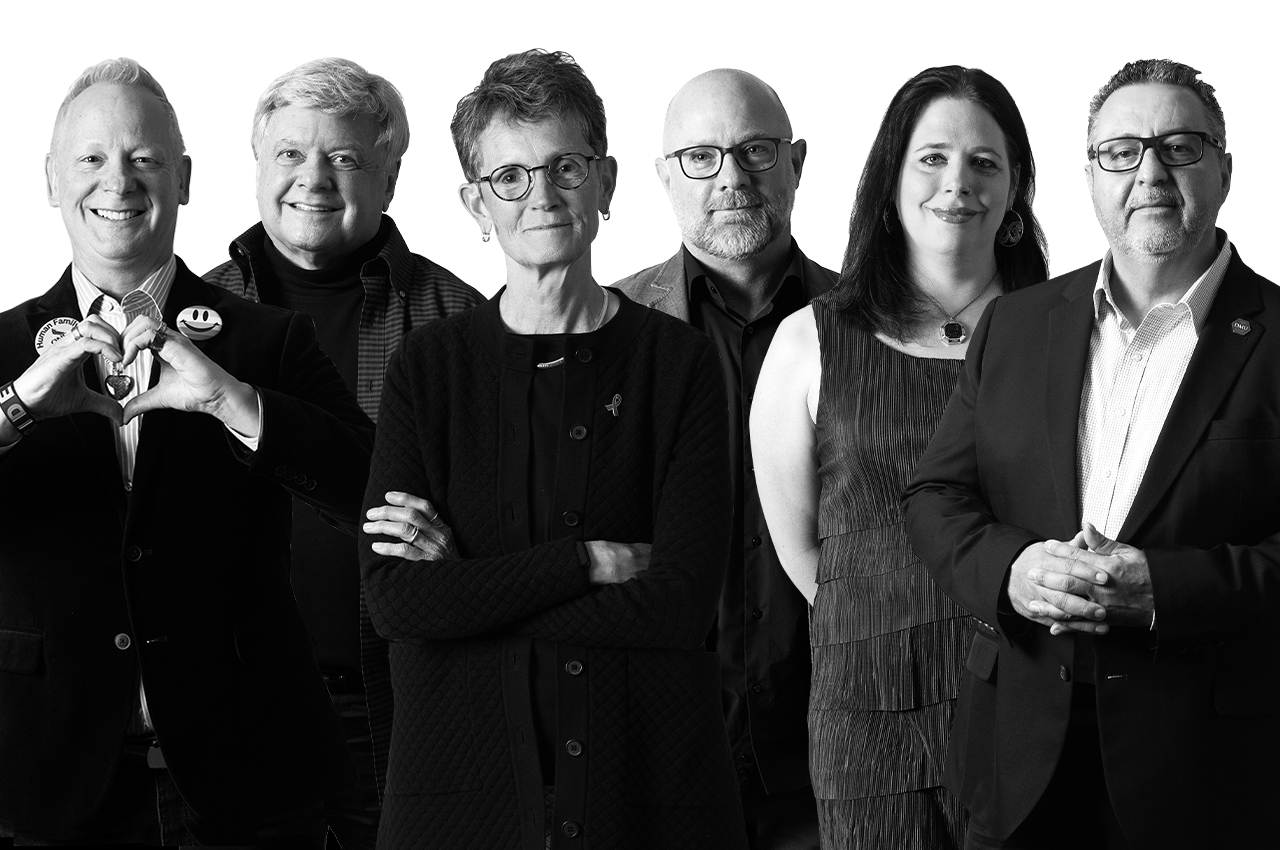From left to right: Rich Hendricks, Rick Miller, Laurie Phelan, Scott Valbert, Aime Wichtendahl, ally Rich Salas
Writers: Hailey Allen and Michael Morain
Photographer: Duane Tinkey
For five years now, dsm has honored LGBTQ Iowans and allies who have made our state a better place to call home. Sometimes they’ve made deliberate progress through their work and community involvement. Other times, they simply had the courage to be themselves.
This year’s honorees told us a few of their stories — of struggle and success — which we are proud to share in the following pages. We celebrated each of these remarkable leaders during an event on Sept. 14 at the River Center. If you missed it, watch a replay here.
“You are brilliant and subtle if you come from Iowa,” the queer writer Gertrude Stein wrote in one of her memoirs, from 1937. “You live as you live and you are always very well taken care of if you come from Iowa.”
It’s too bad she never met the 2023 LGBTQ Legacy Leaders. They take care of us all.
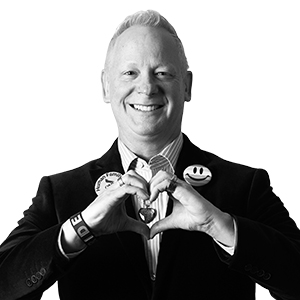
Rich Hendricks
Joy is the first thing you notice about the Rev. Rich Hendricks when he walks into a room. It’s notable in his demeanor and general welcoming aura. You get the feeling that you can be 100% yourself around him, and he’d applaud you.
It’s also evident in his mismatched shoes.
“I was doing the mismatched socks thing, but I was frustrated because they were so cool and nobody ever saw them. The person I was seeing at the time suggested I wear two different shoes,” Hendricks said. So now, no matter the occasion, he sports a sneaker combo.
“Who the hell cares what somebody else thinks about you?” he said. “You should care about what you think of you.”
This life philosophy and egalitarian outlook has made him a popular pastor at the Metropolitan Community Church of the Quad Cities, where he’s worked for nearly 20 years. His faith is the driving force behind his advocacy for equality and inclusivity.
“Following the way of Jesus means seeking social justice,” he said. “We are one human family.”
Early career
Hendricks grew up in Davenport until he went to Drake University. After graduating, in 1980, he left to pursue a law degree at the University of Virginia. Initially, he wanted to be a politician. His final year of law school, he got married to a woman because that was “what you were supposed to do,” he said.
By 1983, Hendricks had finished law school and started a family with his then wife. It was through their kids, he said, that he recognized a call to ministry and the importance of one-on-one connections. His plans to be a politician were rooted in making a positive difference in his community until he realized “there were other ways of effecting change.”
He graduated from divinity school at Emory University in 1989 and served for many years as a United Methodist pastor in Mississippi.
Becoming himself
Hendricks didn’t come out as a gay man until age 40.
“I was by myself in Washington, D.C., at a conference, and I realized, ‘You can look up gay bars in the phone books here!’ Where I lived in Mississippi at the time, you could not do that,” Hendricks said. So he went out that night.
When he went home, he told his wife and children he was gay. He figured he’d never be able to be out and be a pastor, so he moved to Chicago and went back to practicing law. That’s when he met his late first husband, who introduced him to the Metropolitan Community Churches, an international denomination that affirms LGBTQ inclusion and social justice.
“I jumped through hoops to get credentialed in MCC,” he said. “And when it came time to look for a church, the one that needed a pastor was in Davenport” — right back where he grew up.
He and his late husband moved there in 2005, a bit apprehensive of the welcome they might receive. But to Hendricks’ surprise, a lot had changed. “It was like a gay mecca!” he said. “We had seven gay bars at that time in the Quad Cities.”
Working for good
Throughout his time as an openly gay pastor in Davenport, Hendricks has officiated thousands of weddings (especially after Iowa legalized same-sex marriage in 2009) and hosted seminars on LGBTQ history, sexuality and identity. He also founded several organizations to lift up not just his own queer community but other marginalized groups as well. His nonprofit work has included advocating for immigrants and refugees, fighting racism and sexism, and calling for climate protection.
Both his legal and spiritual training have served him well. He knows how to secure permits for marches and parades, write grants and set up nonprofits. And he understands how that can benefit people from all walks of life.
“I’ve learned how incredibly diverse humanity is, and how we’re all the same,” he said. “I’m still amazed at the number of people who insist that the world is black and white. I feel sorry for them, because they miss out on so much.”
Hendricks and his second husband have stayed in Davenport, where Hendricks continues to lead his church congregation and spread joy across the Quad Cities. — H.A.
Distinctions
Co-founded One Human Family QCA, an anti-hate group in the Quad Cities.
Named the 2018 Quad Cities Citizen of the Year by the Quad-City Times.
Co-founded QC Pride Inc. to support the LGBTQ community in the Quad Cities.
“Rev. Rich Hendricks has always chosen to be the ‘upstander’ rather than the ‘bystander.’” – Henry Jay Karp, rabbi emeritus, Temple Emanuel in Davenport
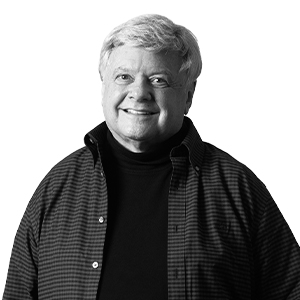
Rick Miller
For the historical record, let it be known that the pie that splattered across Anita Bryant’s face was banana cream. The famous beauty queen, singer and anti-gay activist had been criticizing “the homosexuals” during a press conference in Des Moines in 1977 when a protester served her the dessert with infamous gusto.
“This. Went. National,” Rick Miller said of the stunt, which galvanized the LGBTQ community across Iowa. “So thank you, Anita Bryant,” he added, with a mischievous twinkle. “I call her the queen of unintended consequences.”
In honor of her royal highness, the Polk County Heritage Gallery served banana cream pie at an opening reception a few years ago for an exhibition Miller curated about the history of the gay rights movement. The display with state and national timelines could have included a third about Miller himself, who personally witnessed many of the movement’s key turning points. He is Iowa’s gay Forrest Gump.
Many of the flyers, posters and artifacts that Miller stashed away over the years are now in the archives at the Des Moines Pride Center. He didn’t collect them for the sake of posterity, but future historians may appreciate his tidy, pack-rat habits.
Small-town roots
Miller enjoyed an idyllic boomer childhood in Sac City, surrounded by friends and extended family. He was always a joiner — Cub Scouts, Sunday school — and an organizer, too. Even as a young boy, he dug out Christmas lights from storage to set up a carnival for the neighborhood kids. Other times, he invited them over for craft time with paper and chalk.
So it wasn’t a big surprise that he became an art teacher after earning a degree from the University of Northern Iowa. It was during his college years, in the early ’70s, when he came to terms with his sexuality.
He and his parents were having lunch one day when they got into a disagreement over a Des Moines Register article about a sculpture at Merle Hay Mall that portrayed a naked winged man on a tricycle. Miller’s parents thought it was indecent, but Miller didn’t see what the fuss was about.
“It led to my father saying, ‘Are you queer?’” Miller said. “It took me totally off guard. I wasn’t ready for that conversation at all.” But he bit the bullet: “I said, ‘Well, actually, they say “gay” now, Dad. And yes, I am.’”
His parents weren’t happy about it, but they accepted things more quickly than he had feared.
Leading by example
Miller landed a job in Newton, where he taught elementary school art for 32 years, and then in Des Moines, as a sub, for five more. He earned a master’s degree from Iowa State in 1997 and a statewide teaching award in 2001.
He joined a number of gay organizations but kept a low profile for fear of losing his job. One group, called the Gay Coalition of Des Moines, organized speakers, performances and even a phone line. He said, “People would call from Boone and say, ‘Where’s the gay bar?’” Other LGBTQ groups popped up later, including a chorus, a theater company, a sports league and various activist organizations. Whenever Miller joined a group, he usually ended up on the board before passing off the duties to someone else.
“ ‘Steadfast’ and ‘perseverance’ are extremely important words,” he said. “Show up. Be steadfast in your thinking, and you can make a change in the world.”
Miller is currently involved with the Des Moines Gay Pride Center, which has launched a biography project to document the lives of local LGBTQ leaders. They also hope to publish a history of local gay bars and organize a bus tour during Pride month, so folks can learn about the city’s LGBTQ history.
There’s a good chance the tour will stop at the site of Anita Bryant’s press conference. That story came up a few years ago at the First Friday Breakfast Club, where there was some disagreement about the pie’s flavor. Someone suggested it was chocolate, based on the newspaper photos, but Miller confirmed it was banana cream. Leave it to the archivist to get it right. — M.M.
Distinctions
Served in leadership roles for the Des Moines Gay Men’s Chorus; Des Moines Pride Center; First Friday Breakfast Club; Gay Coalition of Iowa; Gay and Lesbian Resource Center; and Plymouth United Church of Christ.
Curated “Evolution of the Revolution: 50 Years Since Stonewall” in 2019 at the Polk County Heritage Gallery.
Named the 2020 Person of the Year by Capital City Pride.
“Rick is tireless in his work to make LGBTQ+ people visible and accepted. He gave others courage by his own example and his encouragement to be involved.” – Diana Prince, president, Des Moines Pride Center
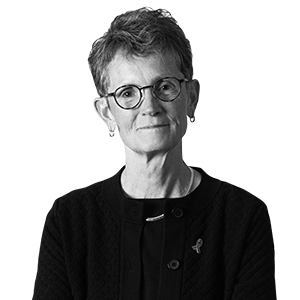
Laurie Phelan
When Laurie Phelan founded Iowa Jobs for America’s Graduates in 1999, her goal was simple: to help students succeed. She recognized the need for a comprehensive approach to overcome the barriers some students face in obtaining an education and finding meaningful employment. So she established iJAG as a bridge between school and the world of work.
“It was early on in my career that I started feeling like, ‘You know, not everybody is treated the same.’ There were a lot of mean behaviors toward people in situations not of their own making,” she said. People who were living in poverty, who were from underserved neighborhoods, or who identified as anything other than “normal” often struggled to navigate through life. And she wanted to help.
She became a cheerleader and a confidant — like a favorite aunt who listens to your dreams and encourages you to chase them, no matter what others think — to thousands of kids in her 20-plus years of serving them.
Her advocacy and support for these young Iowans stemmed from the principles she learned growing up Irish Catholic. She put it simply: “The No. 1 rule is to love each other.”
Leaving the farm
Phelan was raised on her family farm in Farrar, an unincorporated township in northeast Polk County. As a girl, she thought she would be a farmer, too, but as she grew, so did her desire to see what else the world had to offer.
“I realized there was more of a life, and more to explore by leaving,” she said. She lived in other states — Arizona, Wisconsin, Colorado — and traveled around the world but was drawn back to Iowa. “I actually came home to the very farm that I couldn’t wait to get off of,” she said with a laugh.
Along the way, Phelan had discovered she had a knack for working with young people and a passion for improving education. She was running several school reform programs for the Iowa Department of Education when she was introduced to the national Jobs for America’s Graduates (JAG) program. Gov. Tom Vilsack asked her to look into it, hoping it could help solve some of the challenges Iowa students were facing. What Phelan found was an organization committed to lifting up struggling youths and preparing them to lead successful, fulfilling lives. So she founded the Iowa affiliate.
Leaving a legacy
Founding a program like iJAG is about more than education. To Phelan, the program embodies her values — inspiring, encouraging and, above all, accepting participants in ways that change their lives. When young people feel supported and are treated like they matter, she said, they thrive. She’s seen it work time and time again, with all kinds of kids. Phelan’s genuine enthusiasm and boundless support certainly have that effect on people.
“We do have a lot of diversity on all types of fronts. We have young kids struggling with who they are, where they grew up, what they could become. They’re going through all types of abuse, bullying, neglect,” she said. “So we started [iJAG] and made sure that every young person knew, whoever they were, however they showed up, that we wanted to work with them.”
Phelan could relate to many of the iJAG participants because she herself felt different at an early age. She noticed she had different attractions than her younger sisters. “One of these things was not like the others,” she said with a smile. But she figured it out, and when she worked up the nerve to talk to her parents about being gay, she felt blessed. “My parents just loved all their kids no matter what.”
That experience influenced her entire career, right on through 2022, when she stepped down as iJAG’s president and CEO. She now serves as its executive strategist. To her, labels never mattered. She takes the iJAG motto to heart: “That kid, no matter what.”
“It’s not about all of those things that people want to make you. It’s about how you show up,” she said, describing the ripple effects that radiate when people decide to show up as they truly are. She figures her own example of being her full self shows young people who are struggling that they, too, can find hope, possibilities and love.
And that makes Iowa better, for everybody. — H.A.
Distinctions
Founded iJAG, a nonprofit that helps young people overcome barriers such as poverty, academic challenges and trauma.
Served on the Iowa Governor’s STEM Advisory Council, an educational initiative designed to encourage students to pursue careers in science, technology, engineering and math.
“Laurie has been a champion of the nonprofit industry, supporting youth in getting the resources they need, and being an incredible role model for LGBTQ individuals to aspire to be a leader like her.” – Daniel Zinnel, CEO of Proteus Inc.
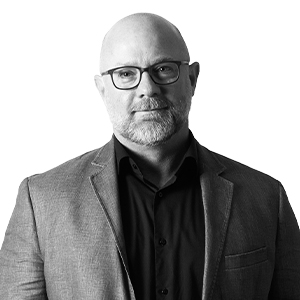
Scott Valbert
As a communications consultant and freelance writer, Scott Valbert is used to telling someone’s story. But now he’s on the other side, sharing his story with us.
His journey as a leader grew out of his passion for connecting people and communities, whether that was producing internal company communications, marketing materials, or employee newsletters and magazines. Early in his corporate career, he recognized an opportunity to elevate inclusion efforts each day through his work but also by just being himself.
He came out at work in the mid-’90s, when doing so was less common and general attitudes toward the LGBTQ community weren’t as welcoming. That ahead-of-the-curve decision put him on a path to lead change and pave the way for others to follow.
Awareness at work
Valbert’s career at a handful of major corporations and organizations has been marked by his commitment to inclusivity, compassion and positive change. At Bank of America, Bankers Trust, Principal, Wells Fargo and the United Way, his influence has helped create spaces where marginalized or minority groups feel safe and respected.
“In a lot of the roles that I held, I was fortunate to be sort of the mouthpiece for these organizations,” he said. “To be able to talk about their brand and their commitment to the community was exciting. … I had an opportunity to help really push forward diversity, equity and inclusion efforts.”
In fact, Valbert first decided to come out to his co-workers in 1995 after overhearing office chatter about the Des Moines School Board election that ousted longtime member Jonathan Wilson, who’d been publicly outed.
“People at work were saying some pretty awful things,” Valbert recalled. “I finally just said to everybody, ‘Hey, you need to stop this, because I’m gay and what you’re saying is super hurtful.’ And everyone just went quiet.”
Valbert’s courage in that moment led to important conversations and reflections within the office, which eventually became a more inclusive place to work for him and other LGBTQ employees. “From that moment on, I thought, ‘OK, I need to continue to do this,’” he said.
Advocacy after hours
Valbert has been involved with numerous LGBTQ nonprofits over the years, including Iowa Safe Schools, One Iowa and the Human Rights Campaign. His participation has also extended to other organizations like United Way of Central Iowa and the Young Women’s Resource Center, always emphasizing the interconnectedness of equity and inclusion.
“My focus right now is less on LGBTQ organizations, because I think they already have a great bench of talent on their teams,” he said. Instead, he tries to place himself in community spaces where he can still provide a minority perspective. “I want to get myself and other LGBTQ people on boards that influence the issues that are important to our community,” such as hunger, housing and mental health.
He left the corporate world two years ago to fly solo and continue this mission. Currently, he’s a freelance consultant with several companies to help them develop and refine their communications strategies and DEI messaging.
“It’s been pretty heavy recently for the LGBTQ community. We’ve been under attack from legislation, we’ve been under attack in social media marketing campaigns, we’re being attacked in schools with book banning,” he said.
He copes by getting involved in the community, by trying to make some progress in the world. Even little changes can make a lasting difference, he said, and sooner or later, persistence pays off.
“You have to continue to remind yourself that you are doing better than you think you are,” he said. — H.A.
Distinctions
Served as the board chairman for One Iowa.
Won the national 2018 Silver Anvil Award from the Public Relations Society of America.
Served on Bankers Trust’s DEI committee from 2016 to 2021 and led the bank’s anti-racism efforts in 2020.
“I’ve watched him work both behind the scenes and on the front line to ensure all voices are heard and individuals are treated with fairness. His kind and inclusive approach has made our community a better place.” – Emily Abbas, senior vice president, Bankers Trust
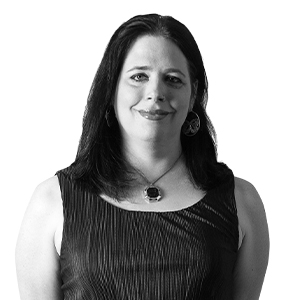
Aime Wichtendahl
When Aime Wichtendahl was growing up, she wanted to be a rock star. She imagined shredding a guitar with Twisted Sister or Skid Row.
That may have been a far-fetched dream but, really, no less improbable than how her life has actually played out. She is a proud mother and the first transgender Iowan elected to public office, first in 2015 and again in 2019 to the Hiawatha City Council.
“I have 10 thumbs and can’t sing,” she said with an easy laugh. “So I figured this is the next best thing.”
Survival skills
Wichtendahl spent most of her early years in Newhall, a tiny town west of Cedar Rapids, where everybody knows everybody pretty well. But Wichtendahl knew herself even better. “I knew I was trans when I was 9 years old,” she said. “I’m probably going to use some saucy language here, but it was kind of an ‘oh, shit’ moment because it’s like, what do I do with this?”
She did her best to fit in. She kept quiet when there was chatter after Ellen Degeneres came out in 1997 or whenever Jerry Springer invited transgender folks to his fracas on daytime TV.
Wichtendahl studied journalism and political science at Kirkwood Community College and Mount Mercy University and then did what she called “the 100% hetero thing of getting married at the age of 20.” When a son named Steven came along, she tried to come to terms with her identity — to be fully honest with herself and her family — but didn’t make much progress.
A turning point came when Steven was 14 months old. “He was having a wonderful day,” Wichtendahl said. “He was playing and doing all the wonderful things kids that age do. And I was so depressed, so overcome with suicidal apathy.”
That was the moment she finally decided to transition, in 2005. She said “it kind of came down to a choice: to either get busy living or get busy dying.”
Her fog of depression cleared and she started living full time as a woman in 2007.
Stepping into the spotlight
So what prompted Wichtendahl to run for public office?
“OK, I was getting a tattoo,” she said. The owner of the tattoo parlor across from Hiawatha City Hall told her the city was forcing the business to move. That didn’t sit well with Wichtendahl, so she decided to run for a spot on the City Council, vowing to support small businesses.
It was a competitive race, with five candidates scrambling for three seats. Wichtendahl campaigned hard and overcame her reluctance to knock on doors. She figured she could eke out a win but was surprised by the televised results: She won the most votes in the whole race.
Her takeaway: Honesty pays off. “Even though people may not always agree with you on certain issues, if you’re honest about who you are and why you think that way, they’ll give you more of the benefit of the doubt than if you try to pander,” she said.
During her two terms, she’s focused on a range of workaday issues like property taxes, multifamily housing and new parks. But she thinks about the big picture, too, including Iowa’s so-called “brain drain.” “A lot of times, local government is really focused on economic development. But how do you keep people in the state when the state government is doing everything they can to push people out?” she said. “Bigotry disguised as policy can’t be allowed to stand.”
At press time, Wichtendahl said it was likely her name will appear on another ballot this fall, but she didn’t specify the office.
“Change is possible,” she said. Her own life, after all, is an example.
“For all the LGBTQ youth suffering right now,” she said, “I know things are hard right now, and the road ahead might be a little bit rocky. But the future is always better with you in it, and you can realize your dreams and a better place to live. So keep your chin up, and we’ll see you down the road.” — M.M.
Distinctions
Became the first transgender Iowa elected to public office in 2015, and reelected in 2019.
Testified at the state Capitol about LGBTQ-focused legislation.
Named One Iowa’s 2021 Donna Red Wing Advocate of the Year.
“She is a fearless advocate and not afraid to hold back any of her thoughts. As a leader in the city of Hiawatha she lives authentically without fear of judgment. She encourages and challenges business leaders to think about diversity in the workplace.” – Elle Wyant, activist and former board member, One Iowa
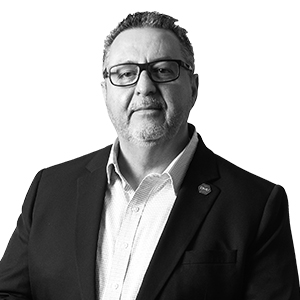
Ally: Rich Salas
Certain moments in life can shift everything into focus. This spring, Rich Salas and his wife were visiting his old stomping grounds in Uvalde, Texas, and stopped by his elementary school, where last year a gunman killed 19 students and two teachers.
“You know, life is fragile, and tomorrow is not promised,” he said. “So we try to do the best we can today to make a positive difference in all people’s lives, regardless of who they love, regardless of who they are.”
Salas puts those words into action as the chief diversity officer at Des Moines University, where he and his colleagues work to create an inclusive campus and, in turn, empathetic graduates out in the world of health care. He also teaches in the department of behavioral medicine, medical humanities and bioethics.
Opening minds on campus
Salas has led the charge at DMU for nearly a dozen years but is quick to share credit with students, staff, faculty and President Angela Walker Franklin. Together, they’ve initiated an LGBTQ health and wellness conference, Trans Health series, Pride Alliance club, and ongoing partnerships with One Iowa and others.
The university also offers Safe Zone training sessions to help its future health care professionals create places where patients feel safe and fully seen. Several years ago Salas scheduled more sessions so more people could attend.
“And I’ll be honest: I got a little pushback,” he said. “With diversity, equity and inclusion, you’re always going to have people who think it’s kind of fluffy stuff. It’s not credible. It’s not valid. And my response to that is that you meet them where they are.”
At the university, Salas has won over skeptics by building programs on evidence-based research and inviting leading experts to share data that shows how DEI strategies can improve medical results. When doctors and nurses create welcoming and inclusive environments, Salas said, “you’re going to produce better outcomes, because [patients] are going to open up about their health issues. You’re going to have a conversation with them, rather than, ‘OK, we’ve got 10 minutes. Here’s what you do: Take this drug, take this prescription, and see you in two months.’”
Besides, he added, the Hippocratic Oath to do no harm doesn’t have an exception clause. “You should treat everyone with dignity, with respect, with compassion.”
Lifelong learning
Over the years at DMU, Salas has been learning right alongside the students, faculty and staff. His own thinking continues to evolve.
Growing up in Texas, he was one of 11 kids in a family of migrant farmworkers. When he was 10, they moved to Fort Collins, Colorado, and Salas eventually took his turn in the fields, picking sugar beets. He studied at the University of Northern Colorado and continued at Colorado State, where he earned a doctorate and worked for about 20 years before moving to Des Moines.
He keeps in touch with his extended family and misses the ones who have passed away, including his brother Ernest, who was gay and had stayed in the closet most of his life. He died a couple of years ago at 51.
“He influenced my life in a very positive way,” Salas said. “I tried to protect him. I tried to advocate for him. And even today, although he’s gone, I know his spirit is with me.”
Ernest was going through a rough patch, when Salas persuaded him to hop in the car for a ride. As they talked, Salas chatted about his job and how his DEI work had opened his mind about a lot of things. They’d parked the car by the time Salas drove home his point: Everyone deserves respect, no matter who they are or whom they love.
“When I told him that, he looked at me and paused. He said thank you and he got teary-eyed, and we just hugged,” Salas said. “Sometimes you don’t have to say anything.”
Salas still wonders whether he could have helped Ernest more or supported him earlier. It motivates his work.
“How many other individuals are out there like my brother?” he said. “They need people like me, like you, like all of us to be true allies.” — M.M.
Distinctions
Received Des Moines University’s 2021 award for Outstanding Faculty Service.
Received the 2018 NAACP President’s Award.
Served on the board of the National Association of Diversity Officers in Higher Education.
Served as a human rights commissioner for the city of West Des Moines.
“Dr. Salas has touched the lives of over 5,000 health professionals who are now in the field providing leadership and offering culturally sensitive health care to the LGBTQ+ community, wherever they practice.” – Pamela Duffy, professor emerita, Des Moines University

